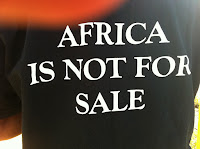The challenges of organizing massive global forums with multiple parallel events, thousands of participants with different languages confront all World Social Forums - Dakar is no exception. Today was the first day of the WSF and it started out with no printed programs and quite a bit of chaos related to logistics. The organizers however had set up bulletin posts at different areas on the campus of Cheikh Anti Diop University so people could get to the workshops and plenary sessions of their choices. Most people had patience and took time to find their desired workshops.

One of the sessions we attended was on “Strategies for International Year for People of African Descent.” Doudou Diene, the former U.N Special Rapporteur on Racism on contemporary forms of racism, racial discrimination, xenophobia and related intolerance - was one of the key speakers. He spoke extensively on the process that led to the Durban Conference Against Racism in 2001 and the challenges related to the declaration and subsequent attempts towards the full implementation.

Also on the panel were Mareille Fanon-Mendes from France, daughter of Frantz Fanon and President of the Franz Fanon Foundation. She spoke passionately about the need to continue building on the foundations set in Durban, South African. She urged participants the world over to join the mobilization for the next gathering towards this that will take place in New York in September of this year. Following her was Jan Lonn, Secretary of the World Against Racism Network and Coura Mbaye Swedish Committee for the International Year for People of African Descent.
As is the case of all Social Forums, many events happen at the same time making it difficult to make choices and prioritize which workshop to attend. The presentations for today ranged a wide spectrum of issues around Africa and the diaspora; a few examples were:
AGRA, land grabbing and GMO in agriculture and alimentation
Gender & Food Sovereignty
Contribution of Muslims in the struggle for the emancipation of peoples in Africa and the Diaspora
Launching of the Campaign 'Let's celebrate family agriculture in Africa'
The Voice of African Migrants from Andalucia
Historical Reparation for Haiti and Diaspora
Local struggles in Western Africa and international solidarity
The best way to get the most was to have colleagues who attended other sessions to take notes and reconnect later in the day for debrief. Some of the sessions on migration were attended by BAJI whose blog you can see here http://blackallianceblog.blogspot.com/


A most wonderful conclusion to the events was a reception hosted by Priority Africa Network to celebrate the conclusion of D2D. The initiative started over a year ago with a group of activists who launched the initiative to make the connections between the U.S. and African countries as well as civil society leaders from across the continent. In Dakar, D2D has gathered some 15 delegates to attend the WSF in Dakar, and more importantly, to take the connections made here to build alliances back in our respective bases.
Participants included PAN members, delegations from Detroit, foundation representatives, activists and friends from different parts of Africa. It was a wonderful way to connect, outside the hectic rush from workshops - to sit and hear each others' stories, organizations, strategies and visions for the future of our collective work.
 Made entirely from discarded plastic, this display was in the middle of the campus at the Cheikh Anta Diop University where passers by were informed about the danges of increasing pile of garbage that is endengering the lives of people on a daily basis and contributing to environmental damages in the long run.
Made entirely from discarded plastic, this display was in the middle of the campus at the Cheikh Anta Diop University where passers by were informed about the danges of increasing pile of garbage that is endengering the lives of people on a daily basis and contributing to environmental damages in the long run.


























